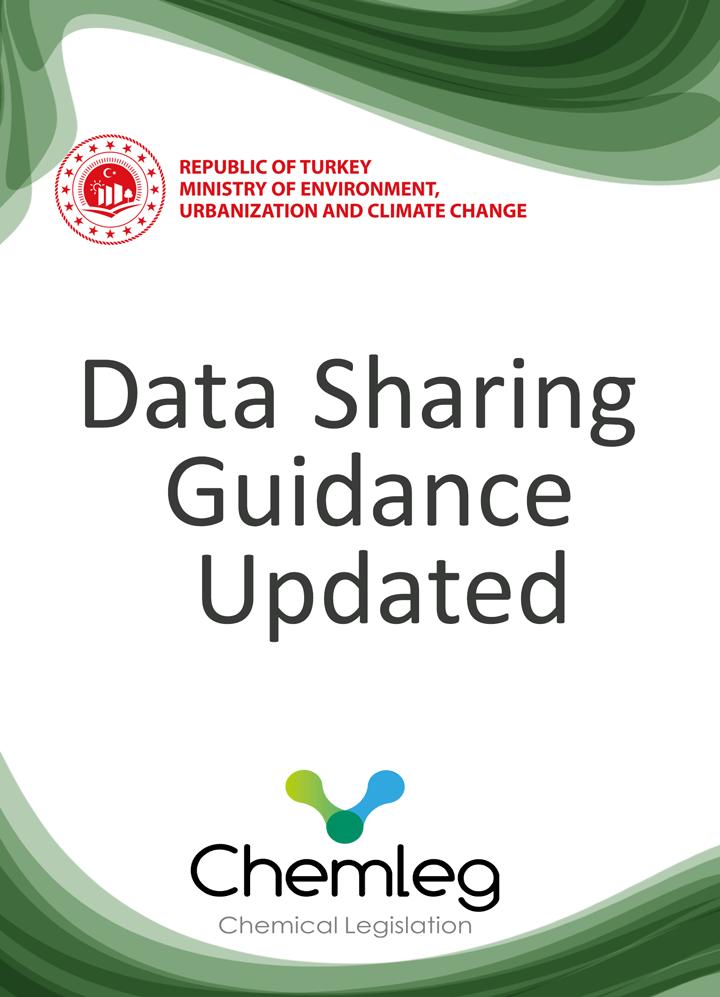
Data Sharing Guidance Updated
For your attention, the Data Sharing Guidance has been updated!
The Regulation on the Registration, Evaluation, Authorization, and Restriction of Chemicals (KKDIK) requires registrants and/or potential registrants to make every effort to reach an agreement on data sharing and the cost of data sharing information required for registration in a fair, transparent and non-discriminatory manner. Rules regarding joint application and data sharing are included in this guidance to ensure the efficient implementation of existing data sharing and joint application obligations.
In this updated version:
- Language improvements have been made,
- The principles of fairness, transparency, and non-discrimination were emphasized,
- The basic principles are explained and practical examples are given to help fulfill the data sharing obligations.
The important issues explained in the Data Sharing Guidance are given as a summary below.
The Data Sharing Guidance will ensure the sharing of necessary information for the registration process in a fair, transparent, and non-discriminatory manner.
This guidance explains the agreements regarding the sharing of data and costs required under KKDIK and the obligations related to its management.
According to KKDIK, for registrant/potential registrant, manufactured or imported substances:
- Collects data and generates data where relevant,
- Use these data to assess the risks,
- Develop and recommend appropriate risk management measures for using the substances throughout their life cycle.
Documenting these obligations requires them to submit a registration dossier to KKS.
Rules are included in this guidance to ensure that the registrant/potential registrant's already existing data sharing and joint application obligations regarding joint application and data sharing are implemented efficiently.
The guidance states that within the scope of the KKDIK Regulation, both administrative costs and costs related to information requirements should be shared transparently and only among the registrants to whom such costs are concerned, and it also clarifies the mandatory elements that should be included in every agreement.
According to the Data Sharing Guidance, a data-sharing agreement is required. It is within the freedom of contract that the parties agree on the form of the data-sharing agreement. However, whatever is chosen, the basic principles of fairness, transparency, and non-discrimination in the KKDIK Regulation are valid. In any case, data sharing is not designed to generate profit for the data owner(s) but to share the actual costs incurred. The following mandatory elements must be included:
a) itemization of the data to be shared and their costs;
b) itemization and justification of the administrative costs;
c) a cost-sharing model, which must include a reimbursement mechanism; any possible future data needs must also be considered to be included in the cost-sharing model.
Each registrant is to be “in legitimate possession of or have permission to refer to the full study report summarised” in a study summary and a (robust) study summary which are to be submitted for the purpose of registration.
Co-registrants should have access to all the information submitted on their behalf in the jointly submitted dossier that they need for their registration and that they have paid for. By paying for a letter of access in order to participate in the joint submission, the co-registrants should have access at least to the endpoint results for which they have paid or to a copy of the robust study summary and study summaries, if available.
The data-sharing agreement must be clear and comprehensible to all parties regarding the content of the dossier and the type of access that is received by paying the agreed share of the costs. It must include the following elements:
- Data itemization
- Cost itemization (Data costs and Administrative costs)
- Cost sharing method
- Reimbursement scheme
- Potential further costs
In case of a data-sharing disagreement within the scope of the KKDIK (Turkey REACH) Regulation, the Ministry will consider whether the parties act in accordance with the obligations set forth in the related guidance.
When conducting data-sharing negotiations, the parties must make every effort to reach an agreement on the sharing of data in a fair, transparent, and non-discriminatory way.
